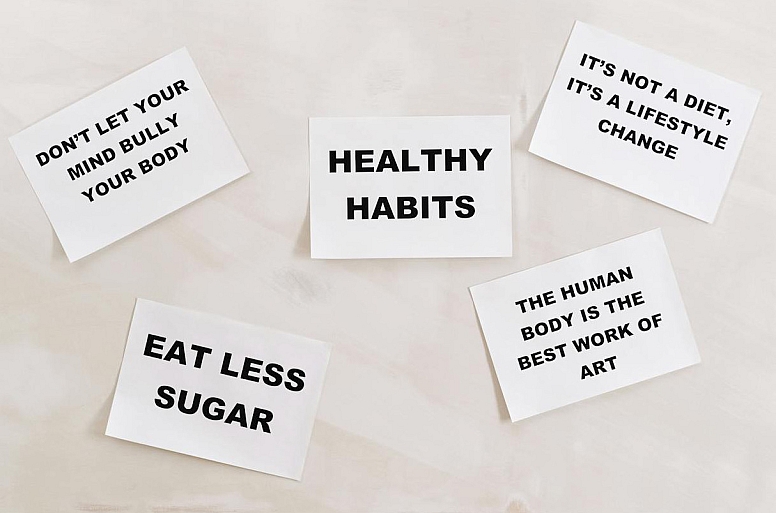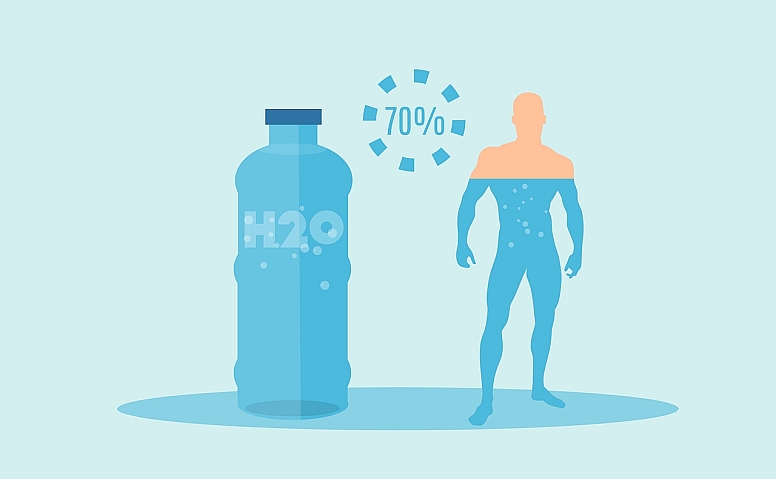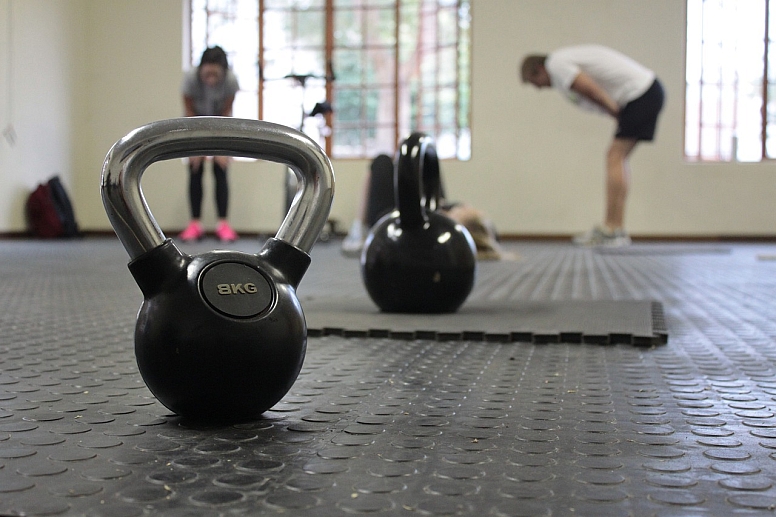
Health and Fitness Tips to Keep Your Body in Shape
Are you looking for effective health and fitness tips to keep your body in shape? Look no further! In this comprehensive guide, we have compiled a range of expert advice and strategies to help you achieve your fitness goals.
Maintaining a healthy lifestyle is essential for overall well-being. Our article provides practical tips on exercise routines, nutritious diets, multivitamins and mental well-being practices to ensure you stay in top form. Whether you're a fitness enthusiast or just starting your wellness journey, you'll find valuable information to help you along the way.
Our brand voice is energetic and motivational, aiming to inspire and empower our readers to lead a healthier lifestyle. We believe that everyone has the potential to achieve their fitness goals, and our article is designed to support you in your journey towards a fitter and stronger body.
So, get ready to take charge of your health and discover the tips and tricks that will keep your body in shape. Let's embark on this exciting adventure together and unlock your full fitness potential.
Importance of Maintaining a Healthy Lifestyle

Maintaining a healthy lifestyle goes beyond just physical appearance. It is about taking care of your body and mind to ensure optimal well-being. By adopting a healthy lifestyle, you can improve your energy levels, boost your immune system, and reduce the risk of chronic diseases.
One of the key aspects of a healthy lifestyle is regular exercise. Engaging in physical activity not only helps in weight management but also improves cardiovascular health, strengthens muscles and bones, and enhances mental well-being. Additionally, exercise releases endorphins, which are known as "feel-good" hormones, promoting a positive mood.
Another crucial element of a healthy lifestyle is a balanced and nutritious diet. Consuming a variety of fruits, vegetables, whole grains, lean proteins, and healthy fats provides your body with essential nutrients. A well-balanced diet plan helps maintain a healthy weight, supports brain function, and reduces the risk of developing diseases such as diabetes and heart conditions.
Lastly, mental well-being is an integral part of a healthy lifestyle. Managing stress, practising mindfulness, and getting enough sleep contribute to overall wellness. Taking care of your mental health allows you to cope with challenges, maintain positive relationships, and enjoy life to the fullest.
Benefits of Regular Exercise

Regular exercise offers numerous benefits that go beyond just physical fitness and weight loss. Engaging in physical activity helps improve cardiovascular health, increase lung capacity, and strengthen muscles and bones. It also plays a crucial role in weight management and reducing the risk of chronic diseases.
In addition to the physical benefits, exercise has a positive impact on mental well-being. It can help reduce symptoms of depression, anxiety, and stress. Exercise releases endorphins, which are natural mood boosters, leaving you feeling happier and more energized.
Moreover, regular exercise improves brain function and cognitive abilities. It enhances memory and focus, boosts creativity, and improves overall productivity. By incorporating exercise into your routine, you can experience improved mental clarity and increased productivity in other areas of your life.
Tips for Staying Motivated to Exercise

Staying motivated to exercise can be a challenge, especially when life gets busy or you face obstacles along the way. However, with the right strategies and mindset, you can maintain your motivation and make exercise a regular part of your life.
One effective way to stay motivated is by setting realistic goals. Start with small, achievable goals and gradually ramp up the intensity or duration of your workouts. Celebrate your achievements along the way to keep yourself motivated and inspired.
Finding an exercise routine that you enjoy is also crucial for long-term motivation. Experiment with different types of workouts, such as strength training, cardio exercises, or group fitness classes, to find what suits your preferences and keeps you engaged. Remember that variety is key to preventing boredom and maintaining interest in your fitness routine.
Accountability can also play a significant role in staying motivated. Find a workout buddy or join a fitness community where you can support and encourage each other. Setting regular workout schedules and tracking your progress can help you stay accountable and committed to your fitness goals.
Lastly, don't forget to reward yourself for your hard work and dedication. Treat yourself to a massage, buy new workout clothes, or indulge in your favourite healthy meal. Rewards can provide positive reinforcement and motivate you to continue your fitness journey.
Healthy Eating Habits for a Fit Body

Maintaining a fit body goes hand in hand with healthy eating habits. A nutritious diet provides the fuel your body needs to perform at its best and aids in muscle recovery and growth.
Start by incorporating a variety of fruits and vegetables into your meals. These colourful foods are rich in vitamins, minerals, and antioxidants, which support your immune system and help fight off diseases. Aim to fill half of your plate with fruits and vegetables to ensure you're getting a wide range of nutrients.
Including lean proteins in your diet is essential for building and repairing muscles. Opt for sources such as chicken, fish, tofu, beans, and lentils. These protein-rich foods also help keep you feeling full and satisfied, preventing overeating and aiding in weight management.
Whole grains, such as quinoa, brown rice, and oats, are excellent sources of complex carbohydrates. They provide a steady release of energy, keeping you fueled through the day. Additionally, whole grains are high in fibre, which aids in digestion and promotes a healthy gut.
Healthy fats, such as avocados, nuts, and olive oil, are important for brain health, hormone production, and nutrient absorption. While fats should be consumed in moderation, incorporating them into your meals can help keep you satiated and support overall well-being.
Remember to stay hydrated by drinking an adequate amount of water during the day. Water is essential for regulating body temperature, lubricating joints, and transporting nutrients. Carry a reusable water bottle with you to ensure you're staying hydrated, especially during workouts.
Importance of Hydration and Its Impact on Fitness

Hydration plays a crucial role in maintaining optimal fitness levels. When you exercise, your body loses water through sweat, and it's important to replenish those fluids to prevent dehydration and maintain performance.
Proper hydration improves exercise performance by regulating body temperature and ensuring efficient muscle function. Dehydration can lead to fatigue, muscle cramps, and decreased endurance, making it harder to complete workouts or perform at your best.
To stay properly hydrated, aim to drink water before, during, and after your workouts. The exact amount of water needed varies depending on factors such as intensity of exercise, climate, and individual sweat rate. As a general guideline, aim for at least 8 cups (64 ounces) of water per day, increasing that amount on days when you engage in vigorous physical activity.
In addition to water, you can also consume electrolyte-rich beverages, such as sports drinks or coconut water, especially during intense workouts or prolonged exercise sessions. These drinks help replenish electrolytes lost through sweat, ensuring proper hydration and preventing imbalances.
Remember that thirst is not always an accurate indicator of hydration levels. By the time you feel thirsty, you may already be slightly dehydrated. Therefore, it's important to drink water regularly during the day, even when you don't feel thirsty.
Incorporating Strength Training into Your Fitness Routine

Strength training is a vital component of any fitness routine, providing numerous benefits for your overall health and well-being. It involves exercises that target specific muscle groups, challenging them to become stronger and more toned.
One of the primary benefits of strength training is increased muscle mass. As you engage in resistance exercises, your muscles adapt and grow, leading to improved strength and endurance. Increased muscle mass also boosts metabolism, allowing you to burn more calories even at rest.
Strength training is not just for bodybuilders or athletes. It is beneficial for people of all ages and fitness levels. By incorporating strength exercises into your routine, you can improve bone density, reduce the risk of osteoporosis, and enhance overall physical performance.
To incorporate strength training into your fitness routine, start by focusing on compound exercises. These are movements that work multiple muscle groups at the same time, such as squats, deadlifts, and push-ups. Compound exercises provide maximum efficiency and target multiple areas of your body in one workout.
Include both bodyweight exercises and exercises with weights or resistance bands to challenge your muscles in different ways. Slowly build the intensity or resistance as your strength improves to continue challenging your muscles and promoting growth.
Remember to allow for proper rest and just as importantly, recovery between strength training sessions. Your muscles require time to repair and rebuild after intense workouts. Aim to allow at least 48 hours of rest in between sessions or alternate between different muscle groups on consecutive days.
The Role of Cardio Exercises in Maintaining Overall Health

Cardiovascular exercises, commonly known as cardio or aerobic exercises, are essential for maintaining overall health and fitness. These exercises increase your heart rate, promote circulation, and improve cardiovascular endurance.
Engaging in regular cardio exercises provides numerous benefits for your body. It helps strengthen your heart and lungs, lowers blood pressure, and reduces the risk of heart disease. Cardio exercises also aid in weight management by burning calories and boosting metabolism.
There are various types of cardio exercises to choose from, allowing you to find activities that suit your preferences and fitness level. Running, cycling, swimming, dancing, and brisk walking are all effective forms of cardio. Choose activities that you enjoy to make your workouts more enjoyable and sustainable.
For optimal results, aim for at least 150 minutes of moderate-intensity cardio exercise or 75 minutes of vigorous-intensity cardio exercise per week. You can break down these sessions into shorter durations throughout the week if that fits better into your schedule. Remember that consistency is key when it comes to cardio exercises.
To challenge yourself and prevent plateauing, incorporate interval training into your cardio workouts. Interval training involves alternating between periods of high-intensity exercise and recovery periods. This method boosts calorie burn, improves endurance, and keeps your workouts interesting.
Tips for Getting Enough Sleep for Optimal Fitness

Getting enough sleep is often overlooked when it comes to fitness goals, but it plays a crucial role in your overall well-being and performance. Sleep is essential for muscle recovery, hormone regulation, and cognitive function.
During sleep, your body repairs and rebuilds muscles that have been stressed during workouts. It also releases growth hormones, which are essential for muscle growth and repair. Adequate sleep allows your body to recover and prepare for the next day's activities.
Lack of sleep can have detrimental effects on your fitness goals. It can lead to decreased energy levels, reduced exercise performance, and slower muscle recovery. Additionally, inadequate sleep affects hormone regulation, leading to increased appetite and cravings for unhealthy foods.
To ensure you're getting enough sleep for optimal fitness, establish a consistent sleep schedule. Aim for 7-9 hours of quality sleep each night. Create a relaxing bedtime routine to signal your body that it's time to wind down. Avoid electronic devices, caffeine, and stimulating activities before bed, as they can interfere with sleep quality.
Create a sleep-friendly environment by keeping your bedroom cool, dark, and quiet. Invest in a comfortable mattress and pillows that support your body's needs. Use blackout curtains or a sleep mask to block out any external light that may disrupt your sleep.
If you struggle with falling asleep or staying asleep, consider practising relaxation techniques such as deep breathing, meditation, or gentle stretching before bed. These activities can help calm your mind and prepare your body for a restful night's sleep.
The Importance of Rest and Recuperation in Fitness

Rest and recuperation are often underestimated aspects of fitness, yet they are crucial for progress and preventing injuries. When you exercise, your muscles experience micro-tears that need time to heal and rebuild. Recovery and rest allow your body to repair and adapt, leading to improved performance and reduced risk of overuse injuries.
There are two types of resting and relaxation: active and passive. Active recovery involves engaging in low-intensity activities, such as walking or gentle stretching, to promote blood flow and aid in muscle recovery. Passive recovery, on the other hand, involves complete rest, allowing your body to heal without any physical exertion.
Incorporating rest days into your fitness routine is essential for overall well-being. It allows your muscles, joints, and connective tissues to recover and adapt to the demands of exercise. Overtraining or neglecting rest can lead to fatigue, decreased performance, and an increased risk of injuries.
Listen to your body and recognize the signs of overtraining. If you experience excessive fatigue, decreased motivation, persistent muscle soreness, or a decline in exercise performance, it may be a sign that you need to incorporate more rest into your routine.
In addition to rest days, prioritize sleep and stress management as part of your recovery routine. As mentioned earlier, sleep plays a crucial role in muscle recovery and hormonal balance. Managing stress through techniques such as meditation, yoga, or spending time in nature can also support your body's recovery process.
Taking Small Steps towards a Healthier Lifestyle
In conclusion, achieving and maintaining a healthy and fit body requires consistent effort and dedication. By adopting a healthy lifestyle, incorporating regular exercise, following a nutritious diet, staying hydrated, and prioritizing Rest and recuperation, you can create a strong foundation for long-term fitness success.
Remember that small steps lead to significant results. Start by setting realistic goals, finding activities you enjoy, and making gradual changes to your lifestyle. Celebrate your achievements along the way, and don't be discouraged by setbacks. Focus on progress, not perfection.
With the tips and strategies provided in this article, you have the knowledge and tools to embark on your fitness journey and keep your body in shape. Take charge of your health, prioritize self-care, and unlock your full fitness potential. You have the power to achieve your goals and lead a healthier, happier life. Let's begin this exciting adventure together!









